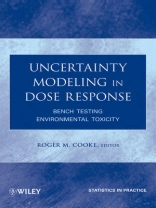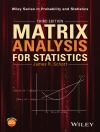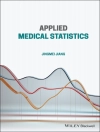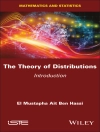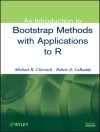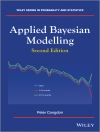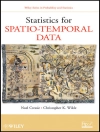A valuable guide to understanding the problem of quantifying
uncertainty in dose response relations for toxic substances
In today’s scientific research, there exists the need to address
the topic of uncertainty as it pertains to dose response modeling.
Uncertainty Modeling in Dose Response is the first book of its kind
to implement and compare different methods for quantifying the
uncertainty in the probability of response, as a function of dose.
This volume gathers leading researchers in the field to properly
address the issue while communicating concepts from diverse
viewpoints and incorporating valuable insights. The result is a
collection that reveals the properties, strengths, and weaknesses
that exist in the various approaches to bench test problems.
This book works with four bench test problems that were taken
from real bioassay data for hazardous substances currently under
study by the United States Environmental Protection Agency (EPA).
The use of actual data provides readers with information that is
relevant and representative of the current work being done in the
field. Leading contributors from the toxicology and risk assessment
communities have applied their methods to quantify model
uncertainty in dose response for each case by employing various
approaches, including Benchmark Dose Software methods,
probabilistic inversion with isotonic regression, nonparametric
Bayesian modeling, and Bayesian model averaging. Each chapter is
reviewed and critiqued from three professional points of view: risk
analyst/regulator, statistician/mathematician, and
toxicologist/epidemiologist. In addition, all methodologies are
worked out in detail, allowing readers to replicate these analyses
and gain a thorough understanding of the methods.
Uncertainty Modeling in Dose Response is an excellent book for
courses on risk analysis and biostatistics at the
upper-undergraduate and graduate levels. It also serves as a
valuable reference for risk assessment, toxicology, biostatistics,
and environmental chemistry professionals who wish to expand their
knowledge and expertise in statistical dose response modeling
problems and approaches.
Table des matières
Acknowledgments ix
Contributors xi
Introduction 1
Roger M. Cooke and Margaret Mac Donell
1 Analysis of Dose-Response Uncertainty Using Benchmark Dose Modeling 17
Jeff Swartout
Comment: The Math/Stats Perspective on Chapter 1: Hard Problems Remain 34
Allan H. Marcus
Comment: EPI/TOX Perspective on Chapter 1: Re-formulating the Issues 37
Jouni T. Tuomisto
Comment: Regulatory/Risk Perspective on Chapter 1: A Good Baseline 42
Weihsueh Chiu
Comment: A Question Dangles 44
David Bussard
Comment: Statistical Test for Statistics-as-Usual Confi dence Bands 45
Roger M. Cooke
Response to Comments 47
Jeff Swartout
2 Uncertainty Quantifi cation for Dose-Response Models Using Probabilistic Inversion with Isotonic Regression: Bench Test Results 51
Roger M. Cooke
Comment: Math/Stats Perspective on Chapter 2: Agreement and Disagreement 82
Thomas A. Louis
Comment: EPI/TOX Perspective on Chapter 2: What Data Sets Per se Say 87
Lorenz Rhomberg
Comment: Regulatory/Risk Perspective on Chapter 2: Substantial Advances Nourish Hope for Clarity? 97
Rob Goble
Comment: A Weakness in the Approach? 105
Jouni T. Tuomisto
Response to Comments 107
Roger Cooke
3 Uncertainty Modeling in Dose Response Using Nonparametric Bayes: Bench Test Results 111
Lidia Burzala and Thomas A. Mazzuchi
Comment: Math/Stats Perspective on Chapter 3: Nonparametric Bayes 147
Roger M. Cooke
Comment: EPI/TOX View on Nonparametric Bayes: Dosing Precision 150
Chao W. Chen
Comment: Regulator/Risk Perspective on Chapter 3: Failure to Communicate 153
Dale Hattis
Response to Comments 160
Lidia Burzala
4 Quantifying Dose-Response Uncertainty Using Bayesian Model Averaging 165
Melissa Whitney and Louise Ryan
Comment: Math/Stats Perspective on Chapter 4: Bayesian Model Averaging 180
Michael Messner
Comment: EPI/TOX Perspective on Chapter 4: Use of Bayesian Model Averaging for Addressing Uncertainties in Cancer Dose-Response Modeling 183
Margaret Chu
Comment: Regulatorary/Risk Perspective on Chapter 4: Model Averages, Model Amalgams, and Model Choice 185
Adam M. Finkel
Response to Comments 194
Melissa Whitney and Louise Ryan
5 Combining Risks from Several Tumors Using Markov Chain Monte Carlo 197
Leonid Kopylev, John Fox, and Chao Chen
6 Uncertainty in Dose Response from the Perspective of Microbial Risk 207
P. F. M. Teunis
7 Conclusions 217
David Bussard, Peter Preuss, and Paul White
Author Index 225
Subject Index 229
A propos de l’auteur
ROGER M. COOKE, Ph D, is Professor in the Department of Mathematics at Delft University of Technology, the Netherlands, and Chauncey Starr Senior Fellow for Risk Analysis at Resources for the Future, a nonprofit organization based in Washington, D.C., that conducts independent research on environmental, energy, and natural resource issues. Recognized as one of the world’s leading authorities on mathematical modeling of risk and uncertainty, Dr. Cooke’s research has widely influenced risk assessment methodology, particularly in the areas of expert judgment and uncertainty analysis.
